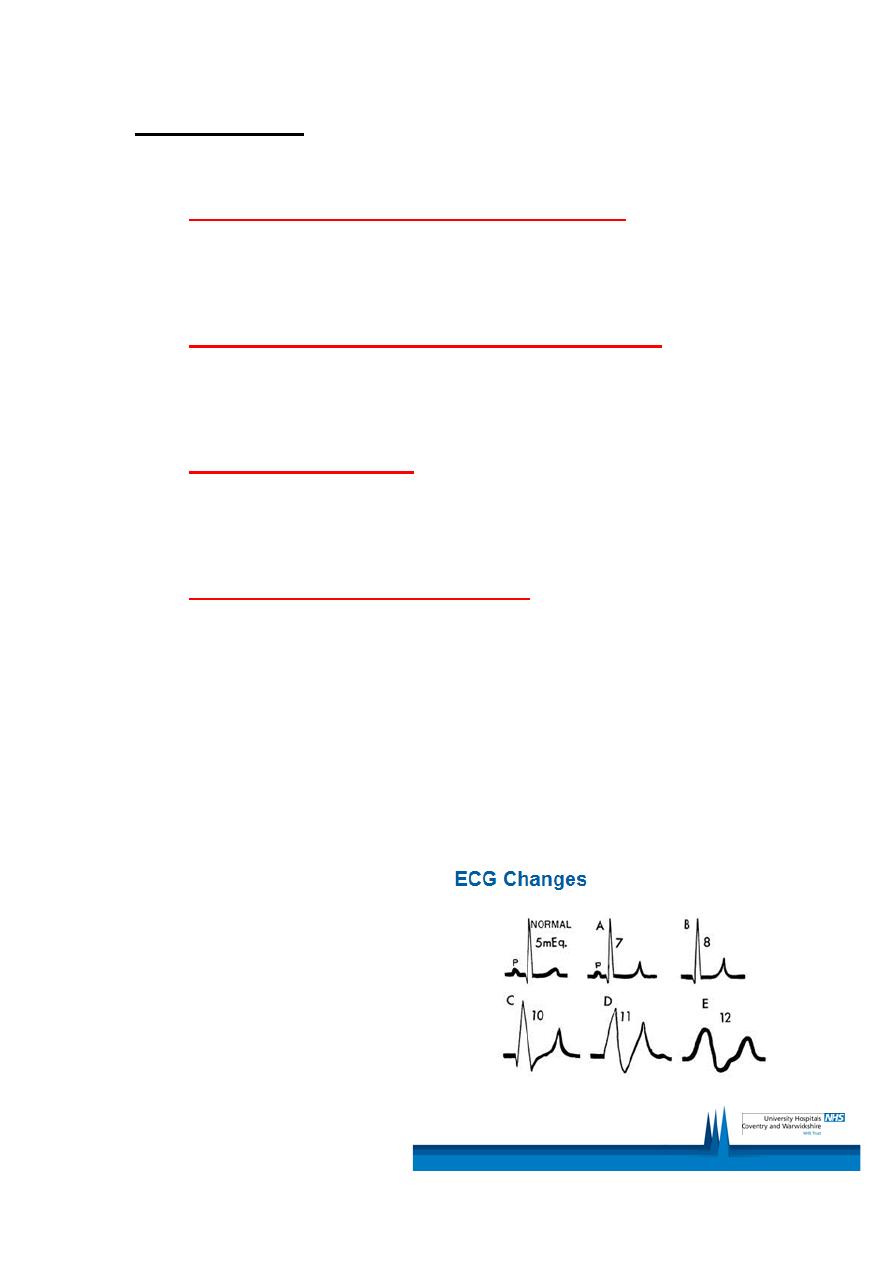
1
Hyperkalaemia
1.Causes of Hyperkalaemia:
•
Decreased or impaired potassium excretion
– renal
failure, potassium-sparing diuretics, urinary obstruction,
sickle cell disease, Addison disease, and systemic lupus
erythematosus (SLE).
•
Additions of potassium into extracellular space
-
potassium supplements (eg, PO/IV potassium, salt
substitutes), rhabdomyolysis, and hemolysis (eg, blood
transfusions, burns, tumor lysis).
•
Transmembrane shifts
(ie, shifting potassium from the
intracellular to extracellular space) - acidosis and medication
effects (eg, acute digitalis toxicity, beta-blockers,
succinylcholine).
•
Factitious or pseudohyperkalemia
- improper blood
collection (eg, ischemic blood draw from venipuncture
technique), laboratory error, leukocytosis, and
thrombocytosis.
2.ECG Changes:
• From reduction of P wave amplitude and prolongation of PR
interval to absence of P waves altogether.
• Increase of QRS duration.
• Increase of QT duration.
• Slowing of heart rate.
• T waves become tall and
spiked.
• Decreased R wave
amplitude.

2
3.Principles of Treatment:
• Stabilise myocardium
• Move it into cells
• Increase elimination
1. Calcium Gluconate... to counteract the effect of K on the heart.
2. Dextrose + Insulin
3. Sodium Bicarbonate
4. Calcium Resonium
5. Salbutamol
6. Furosemide
7. haemodialysis
Hypokalemia
1.Causes of Hypokalemia:
I. Decreased intake
a. Starvation
b. Clay Ingestion
II. Redistribution into Cells
a. Acid-Base (Metabolic Alkalosis).
b. Hormonal (Insulin, Beta agonist, Alpha).
c. Anabolic State (folic acid).
d. Other: Hypothermia, Pseudo hypokalemia.
III. Increased Loss
A. Non-renal loss
1. Gastrointestinal loss.
2. Integumentary Loss (sweat).
B. Renal loss

3
2.Signs & symptoms:
• Fatigue
• Myalgia
• Muscular weakness & paralysis
• Hyporeflexia
• Dyspnea
• Arrhythmia
• Predispose to digitalis toxicity
• Constipation
3.ECG changes:
• Due to delayed ventricular repolarization.
• Early changes: flattening or inversion of T wave, prominent U
wave, ST-segment depression, prolonged QU interval.
• Severe K+ depletion: prolonged PR interval, decreased
voltage and widening of QRS complex.
❖
Periodic limb hypokalaemic paralysis
Patient complain from recurrent attacks of paralysis……monitored
as inpatient due to risk of resp. failure.
Ppt. factors
1. heavy meals of CHO.
2. strenuous exercise.
3. standing from prolonged sitting.
4. awake from prolong sleeping.
Causes
1. idiopathic channelopathy.
1. thyroid disease.
2. other causes of recurrent hupokalaemia.

4
Treatment
1. monitor of repiratory system……FVC.
2. correction of hypokalaemia by oral KCL…if patient sever
symptoms or cannot take orally, so infusion with fluid???????
Mannitol infusion with KCL.
NO NO ….GW OR NORMAL SALINE?????
3. treatment of the cause like thyroid problem.
